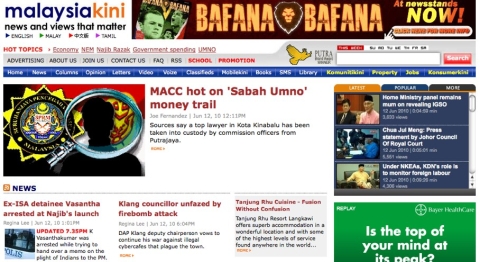
Six media professionals – three print, two video, one business – have tried to absorb over a week’s worth of training, counsel and advice before embarking for five very different efforts to expand the quality and the sustainability of journalism. We are each Knight International Journalism Fellows, a program developed and managed by the International Committee for Journalists, through grants from Knight Foundation and the Gates Foundation.
Now we are each off to our respective destinations – Peru, Haiti, Egypt/Jordan/Palestine, Sierra Leone, Malawi. As for me, I am off to Malaysia where I will work with the team at Malaysiakini.com, the largest online news source in Malaysia and one of the largest online content providers in Southeast Asia.
The scope of my efforts are:“To help develop a sustainable model for multimedia content produced by citizen journalists and design materials and strategies to help media organizations use citizen journalists to increase the flow of information.” Here’s what you can expect to hear from me in the coming months:
Citizen Journalism – its scope, its value, its risks and business models and processes to leverage these valuable volunteer resources to the greatest value of their local societies.
Web 2.0 Business Models for Content Creation (especially journalism). Paid content, membership models, advertising, …
Southeast and East Asian Journalism and Media Landscape – who’s doing what, where there are challenges (legal, administrative, technological), where there are successes.
MalaysiaKini – You will definitely hear some boosterism from me for the team at Malaysiakini.
There are many reasons for my excitement over the work in the coming months. First is the opportunity to work with MalaysiaKini. In ten years, Prem Chandran and Steven Gan have built a significant media company and are constantly testing new ways of involving their audience, building a sustainable business and “increasing the flow of information”. Any success with involving more citizens in the news and reporting process will be in large part due to the work to make MalaysiaKini and its affiliated sites one of the most influential online news operations in Southeast Asia. Second reason for excitement is Malaysia itself. Malaysia is one of the most diverse and technologically sophisticated societies in the world. If a news organization is going to adequately reflect such a diverse and sophisticated audience then tools like citizen journalism, and web 2.0 will be critical to sustainable success. Finally, there is Asia where the spirit of experimentation in the online media world is rapidly matching what you would find in California’s Silicon Valley and the development hotspots in Europe. I hope that with the team at MalaysiaKini maybe we can break a little new ground.
I will try to lay more background on all of this in the next few weeks.
Comments are welcomed, of course. Suggestions are even more valuable.
So, with that… Selamat Tinggal, See you later, 回头见
[Note: yes, I know there are a lot of Indian language speakers in Malaysia, but you gotta give a guy a break…]